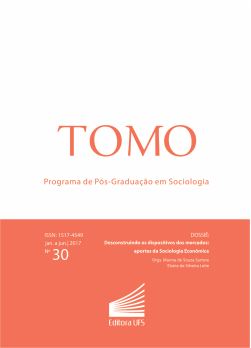Who rules by apparatuses? The production of norms and standards for organic food in Brazil
DOI:
https://doi.org/10.21669/tomo.v0i0.6714Abstract
This paper analyzes the construction of the systems of evalua- tion used in Brazil for organic foods, inspired by the sociological debate on apparatuses and governmentality. It focuseson the disputes concerning the production and control of the appa- ratuses that shape the system of quality guarantee for organic foods, with especial attention to the certification mechanisms. The research has combined documental analysis and interviews with the social actors concerned with the regulation instances for this market. The results expose an appropriation movement of the rules, standards and labels by the dominant actors in the agri-food sector. However, it also shows a counter-movement emerging from innovative experiences of participatory certifica- tion. In this sense, the example of the Ecovida Agroecology Ne- twork reveals the social skills of the challenging actors to build new technical and institutional apparatuses, shifting the power configurations in government arenas.Downloads
Downloads
Published
How to Cite
Issue
Section
License
TOMO journal adopts the Creative Commons CC-BY 4.0 license which allows:
• Share: copy and redistribute the material in any medium or format.
• Adapt: remix, transform, and create from the material for any purpose, even commercial.
Authors who publish in this journal agree to the following terms:
a) Authors retain copyright and grant the journal the right of first publication, with the work simultaneously licensed under the Creative Commons which allows sharing the work with acknowledgment of authorship and initial publication in this journal.
b) Authors are authorized to assume additional contracts separately, for non-exclusive distribution of the version of the work published in this journal (eg, publishing in an institutional repository or as a book chapter), with acknowledgment of authorship and initial publication in this journal.
c) Authors are allowed and encouraged to publish and distribute their work online (e.g., in institutional repositories or on their personal page) at any point before or during the editorial process, as this can generate productive changes, as well as increase the impact and citation of the published work (O Efeito do Acesso Livre).







 The manuscripts from thsi journals are licenced by CC BY.4.0.
The manuscripts from thsi journals are licenced by CC BY.4.0. 